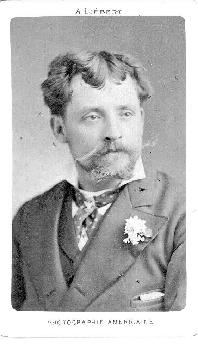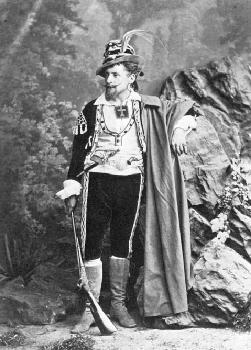Victor Capoul
27 February 1839 Toulouse – 18 February 1924 Pujaudran-du-Gers
Victor Capoul was a French lyric tenor whose thirty-five-year career spanned the latter part of the 19th century. Born Joseph
Victor Amédée Capoul in Toulouse, he received his musical education at the Paris Conservatory, where he studied
with renowned French tenor Alphonse Révial (1810–71). Following his graduation, Capoul made his debut at the
Opéra-Comique as Daniel in Adam's Le chalet in 1861. The young tenor became a popular artist with the theater
and remained a regular member of the company for the next nine seasons. In 1871 he made his first appearance in London as
Gounod's Faust at Drury Lane and made his American debut later that year at the New York Academy of Music as Wilhelm Meister in
Mignon. In 1877, Capoul made his Covent Garden debut as Auber's Fra Diavolo, also singing Almaviva in Barbiere di Siviglia,
Ernesto in Don Pasquale and Elvino in La sonnambula that same season.
Capoul returned to New York in 1879 to sing the role of the poet Ange-Pitou in Charles Lecocq's La fille de Madame Angot at
Grau's French Opera Company. The tenor's Metropolitan Opera debut occurred during the company's inaugural season, on October
27th, 1883 as Faust. Capoul sang 25 performances of six roles during his first season with the Met... the aforementioned Faust,
Wilhelm Meister, Almaviva, Alfredo in La traviata, Edgardo in Lucia di Lammermoor and (although one wonders how he negotiated
the demands of the role) Enzo in La Gioconda. Although his acting and stage deportment were praised, critics complained of the
tenor's "almost inaudible half voice" and remarked that "his singing was often short of the enjoyable". It is not surprising
that when Capoul returned to the Met for the 1891/92 season, he was relegated to the secondary roles of Tybalt in Roméo
et Juliette and Cassio in Otello. His final appearance with the company was a concert on April 24th, 1896. During a
Testimonial Performance to Henry E. Abbey and Maurice Grau, Capoul sang as part of the Soldiers' Chorus from Gounod's Faust.
Considering that he had made his debut with the company in the title role of this same opera some thirteen years previously,
this seems something of a sad comedown.
Capoul remained in New York for several years, having been appointed opera coach and professor of voice at The National
Conservatory of Music of America in 1892. His singing days now behind him, Capoul returned to Paris in January of 1900, making
a bid for the position of General Director of the Opéra-Comique. When he was declined, his old friend and colleague
Pierre Gailhard appointed him Director of Theatrical Studies at the Opéra de Paris. Now regarded as one of the leading
stage directors for French and Italian opera, Capoul returned to New York in 1906 to direct productions for Hammerstein's
Manhattan Opera Company. Sadly, he was plagued by increasing deafness that greatly hampered his artistic activities. He
retired to the south of France and lived quite comfortably until wartime investments stripped him of his fortune. To raise a
bit of capital, the tenor tried to auction off some of the mementos from his career. When there were no takers, he angrily
burned all of his costumes, scores and photographs. Capoul lived out his final years on his little farm near the village of
Pujaudran-du-Gers, subsisting on a small pension. Penniless, bitter and forgotten, he passed away on February 18th, 1924, just
a week shy of his 85th birthday, a tragic end for such a great artist.
Victor Capoul boasted a diverse repertoire of nearly 40 roles in opera and operetta, including Tonio in La fille du
régiment, Georges in La dame blanche, the Duke in Rigoletto, des Grieux in Manon, Lyonel in Martha and the title roles
in Meyerbeer's Robert le diable and Méhul's Joseph. He created the tenor leads in a number of works such as Gounod's La
colombe and Offenbach's Vert-Vert. In addition to Paris, London and New York (the cities where he spent most of his career),
Capoul travelled to Monte Carlo, Brussels, Moscow, St. Petersburg, Vienna and Québec. He also co-authored the librettos
for Godard's opera Jocelyn and Camondo's operetta Le clown. Although the tenor never possessed an extraordinary voice, he did
cultivate a remarkable technique and built his reputation on artistry, musicality and magnetism. His recorded legacy consists
of a single aria, the Berceuse from Godard's Jocelyn. Four takes were recorded for Fonotipia in Paris in 1905, two of which
are known to survive. Although Capoul's vocal resources are greatly diminished – not to mention the fact that he was nearly
stone deaf – he manages to give a fascinating performance, leaving us something of a time capsule from the world of
19th-century French opera.
Copyright: Youtube channel "Dead Tenors' Society"
In 1899, several Berliner records were made by a soprano, a tenor and a basso under the name Les Troubadours Toulousains.
Such a group is not otherwise known to have existed, so the three evidently just called themselves thus for that Berliner record
session. Of the nine recordings made on that occasion, I know of only two to have survived, and at least one of them –
the finale from Faust – in merely one copy. About 1950, the then owner of that record played it to three veteran
opera singers from the South of France, Pauline Agussol, François Mézy and... certainly not Édouard Codou,
as legend would have it, since Codou died in 1925. However, the three old singers are said to have identified the "Troubadours
Toulousains" as Alice Baron, Victor Capoul and Pierre Gailhard. I cannot vouch for Baron, but in the cases of Gailhard and Capoul,
it seems possible with all due caution.
|

